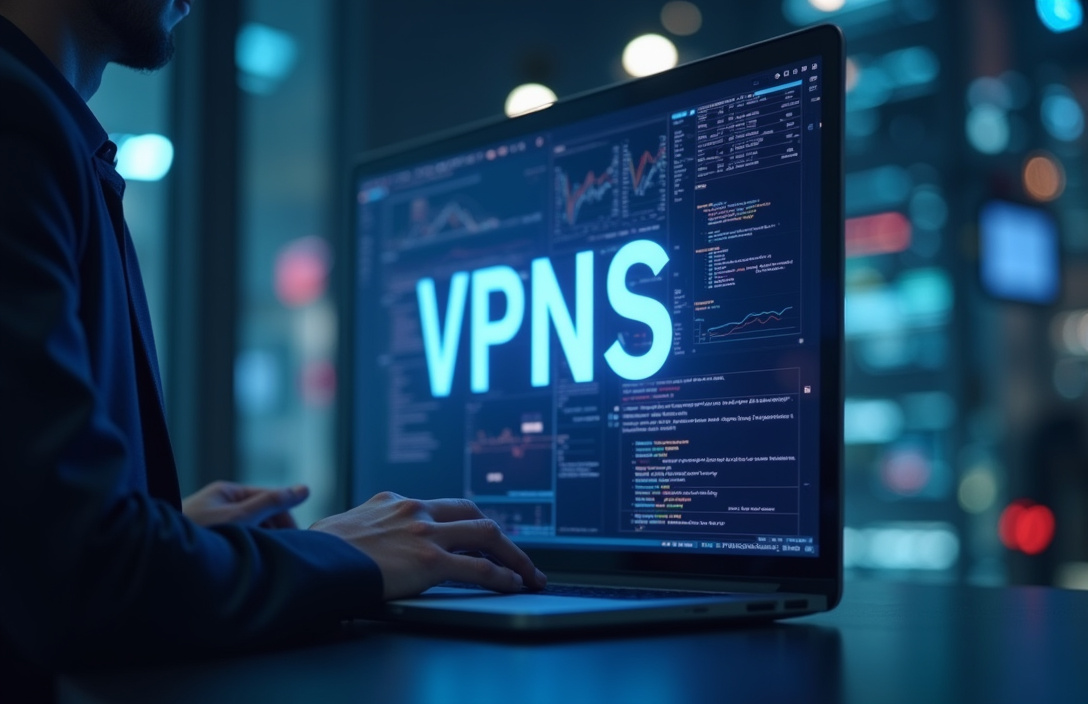VPNs for Digital Marketing Agencies: Protecting Campaign Analytics

Table of Contents
In today's rapidly evolving digital ecosystem, marketing agencies are entrusted with a vast and ever-growing ocean of sensitive data. This data, encompassing everything from meticulously gathered campaign analytics to confidential client information and proprietary strategic insights, serves as the very lifeblood of effective and impactful marketing campaigns. However, this treasure trove of information also presents a significant challenge: ensuring its security and preventing its exposure to malicious actors.
A data breach, whether intentional or accidental, can have devastating consequences for an agency, leading to substantial financial losses, irreparable reputational damage, and potential legal liabilities that can cripple even the most well-established firms. Therefore, digital marketing agencies must recognize that prioritizing data protection is not merely an optional add-on, but a fundamental necessity that must be placed alongside campaign performance and creative innovation. In this context, a Virtual Private Network (VPN) emerges as a powerful and versatile tool that can significantly enhance the security posture of marketing agencies, safeguarding their invaluable campaign analytics and sensitive client data from a wide array of potential threats.
A correctly configured VPN acts as a digital shield, protecting sensitive data from prying eyes by encrypting all traffic that leaves the agency's network and masking the agency's true IP address, making it exponentially more difficult for cybercriminals to track and monitor the agency's online activities. In essence, it extends a secure and impenetrable tunnel for marketing agencies to conduct their critical business operations privately and confidently, ensuring the confidentiality of the strategic insights they leverage to develop and propel successful marketing campaigns. The benefits of implementing VPNs within digital marketing agencies are numerous and far-reaching, extending from safeguarding client confidentiality and complying with stringent industry regulations to bolstering internal security protocols and maintaining a competitive edge in the marketplace.
By implementing a robust and well-managed VPN solution, agencies can effectively demonstrate their unwavering commitment to data protection and build a strong foundation of trust with their clients, who increasingly demand assurances that their sensitive information is being handled with the utmost care and security. With a properly configured VPN in place, a marketing agency not only reinforces its reputation but also bolsters its ability to maintain a strategic advantage in a highly competitive marketplace where data security is a key differentiator. Moreover, this proactive step towards enhanced digital security helps foster a culture of respect for privacy and a deep commitment to ethical marketing practices within the organization, setting a standard for responsible data handling and promoting a culture of security awareness among all employees.
When selecting a suitable VPN solution, marketing agencies should carefully consider several critical factors, including the level of encryption offered, the geographic location of the VPN's servers, the speed and reliability of the connection, and the privacy policy of the VPN provider itself. It is also essential for agencies to ensure that the chosen VPN solution complies with all relevant data protection regulations, such as the General Data Protection Regulation (GDPR) and the California Consumer Privacy Act (CCPA), to avoid potential legal repercussions. The implementation of a VPN should be viewed as an integral part of a comprehensive and holistic security strategy that also includes the use of strong passwords, multi-factor authentication, and regular security audits to identify and address potential vulnerabilities.
The VPN's primary function is to safeguard data privacy while simultaneously enhancing the overall reliability and resilience of the agency's infrastructure against a wide range of cyber threats, from malware and phishing attacks to sophisticated hacking attempts. This comprehensive approach fortifies the agency's ability to deliver exceptional results for its clients by creating a digital fortress that shields it from both internal vulnerabilities and external attacks, ensuring the confidentiality and integrity of its data assets. In a dynamic and competitive field driven by innovation and creativity, incorporating a reliable and well-managed VPN is not just a technical necessity, but a strategic investment in fortifying the foundational aspects of the agency, enabling it to innovate securely and deliver impactful marketing campaigns without compromising the security or privacy of its valued client data.
Campaign analytics have become the indispensable compass guiding marketing agencies in their quest to optimize strategies and achieve tangible business results. The ability to track, measure, and interpret campaign performance is paramount, allowing marketers to refine their approaches, maximize return on investment, and ultimately drive growth for their clients. However, beneath the surface of these seemingly innocuous datasets lies a wealth of sensitive information that presents a significant security risk.
Campaign analytics often contain a treasure trove of client data, including customer demographics, detailed purchase histories, browsing behavior patterns, and even personally identifiable information (PII). This data is not only valuable to marketing agencies but also highly attractive to hackers and cybercriminals seeking to exploit vulnerabilities for financial gain or other malicious purposes. The vulnerabilities in campaign analytics security can stem from a variety of sources, representing a complex web of potential entry points for attackers.
These vulnerabilities include the use of unsecured networks, where data transmitted over public Wi-Fi connections is susceptible to eavesdropping and interception; weak or easily compromised passwords, which provide unauthorized access to sensitive accounts and systems; and the use of unencrypted data transfers, leaving data exposed during transmission between different points. When marketing agencies access critical campaign analytics data over public Wi-Fi networks in coffee shops, airports, or other public locations, they are particularly vulnerable to sophisticated eavesdropping and data theft attacks. Hackers can employ readily available tools and techniques to intercept data transmitted over these networks, gaining unauthorized access to sensitive client information, strategic insights, and proprietary campaign data.
To effectively mitigate these inherent risks, marketing agencies must adopt a multi-layered security approach, starting with the consistent and unwavering use of a VPN whenever accessing campaign analytics data over public Wi-Fi networks or any potentially unsecured connection. In addition to the use of VPNs, agencies should implement robust password policies that enforce the use of strong, unique passwords and require employees to use multi-factor authentication (MFA) to protect their accounts from unauthorized access. MFA adds an extra layer of security by requiring users to provide two or more independent factors of authentication, such as a password and a code sent to their mobile device, making it significantly more difficult for attackers to gain access even if they manage to compromise a password.
Data encryption is another essential security measure that must be implemented at all levels. Agencies should ensure that all campaign analytics data is encrypted both in transit, while being transmitted over networks, and at rest, while being stored on servers or other storage devices. Encryption transforms data into an unreadable format, effectively scrambling the information and rendering it useless to hackers even if they manage to gain unauthorized access to the underlying data.
By encrypting campaign analytics data, agencies can significantly reduce the risk of data breaches and protect the confidentiality of sensitive client information. Access control mechanisms are equally important in maintaining campaign analytics security. Agencies should adopt a strict principle of least privilege, restricting access to campaign analytics data to only those employees who absolutely need it to perform their specific job duties and responsibilities.
This approach minimizes the potential for insider threats, whether intentional or unintentional, and reduces the risk of accidental data leaks or unauthorized access. Agencies should also rigorously monitor and regularly audit access logs to ensure that only authorized employees are accessing campaign analytics data and that no suspicious activity is taking place. Regular audits can help identify anomalies and potential security breaches, allowing agencies to take prompt corrective action.
Client data stands as the bedrock of any thriving marketing agency, representing the invaluable asset upon which successful campaigns are built and lasting client relationships are forged. Protecting this data is not merely a matter of compliance or risk mitigation; it is both an ethical imperative rooted in principles of trust and responsibility, and a strategic imperative that drives competitive advantage and bolsters long-term sustainability. In an era where data breaches and privacy violations are increasingly prevalent, clients are becoming acutely aware of the importance of data security and are demanding assurances that their sensitive information is being handled with the utmost care and diligence.
Protecting client data transcends simple legal compliance; it is about cultivating trust and fostering lasting partnerships. Clients are increasingly discerning, actively seeking out agencies that not only deliver exceptional results but also demonstrate an unwavering commitment to data protection. They recognize that a data breach can have catastrophic consequences, not only for their own businesses but also for their reputations and customer relationships.
Therefore, a robust data protection strategy can serve as a powerful differentiator, attracting new clients and solidifying existing relationships. Data privacy regulations such as the General Data Protection Regulation (GDPR) and the California Consumer Privacy Act (CCPA) have fundamentally reshaped the landscape of data protection, imposing strict requirements on how agencies collect, use, and protect client data. Failure to comply with these regulations can result in significant financial penalties, crippling reputational damage, and potential legal liabilities.
By implementing a robust VPN solution and other comprehensive security measures, agencies can effectively demonstrate their commitment to data privacy and compliance, mitigating the risk of regulatory sanctions and building confidence among their clients. Client data protection extends far beyond simply adhering to legal and regulatory requirements. It encompasses a broader commitment to building trust and fostering transparency with clients.
When clients have confidence that their data is safe and secure, they are more likely to share sensitive information with the agency, enabling more effective and targeted marketing campaigns. Agencies can cultivate trust by being transparent about their data protection practices, providing regular security updates, and proactively addressing any concerns that clients may have. An essential component of a comprehensive client data protection strategy is a well-defined incident response plan.
Agencies should have a detailed plan in place to respond effectively to data breaches and other security incidents, minimizing the potential damage and ensuring business continuity. This plan should include clear procedures for notifying affected clients promptly, conducting a thorough investigation of the incident, and implementing appropriate remediation measures to prevent future occurrences. By having a proactive incident response plan in place, agencies can demonstrate their preparedness and commitment to mitigating the impact of data breaches, maintaining client trust even in the face of adversity.
In addition to technical security measures, agencies should implement comprehensive policies and procedures to govern how client data is handled throughout its lifecycle. These policies should address critical areas such as data retention periods, data disposal methods, and data sharing protocols, ensuring that client data is handled consistently and securely across the entire organization. By establishing clear policies and procedures, agencies can minimize the risk of human error and ensure that client data is treated with the utmost care and respect.
Furthermore, agencies should conduct regular data privacy audits to assess the effectiveness of their data protection measures and identify areas for improvement. These audits should encompass a review of policies, procedures, technical controls, and employee training programs to ensure that the agency is maintaining a robust security posture and adhering to best practices in data privacy.
Navigating the complex landscape of data privacy and security requires marketing agencies to embrace a multifaceted approach that extends beyond the implementation of a single technology or tool. While a VPN serves as a crucial cornerstone in protecting sensitive data, it must be integrated into a broader, more comprehensive security strategy to provide robust and layered protection against evolving cyber threats. Building a resilient security posture necessitates a holistic approach that encompasses not only technological safeguards but also well-defined policies, rigorous procedures, continuous monitoring, and comprehensive employee training programs.
One of the most critical aspects of establishing a strong security foundation is implementing robust access controls and authentication mechanisms. Agencies must implement the principle of least privilege, granting employees access only to the data and resources they absolutely need to perform their job functions. This minimizes the potential for insider threats and reduces the risk of unauthorized access to sensitive client data.
Multi-factor authentication (MFA) should be enforced for all accounts, requiring users to provide multiple forms of identification to verify their identity and prevent unauthorized access even if their passwords are compromised. Regular password audits and enforcement of strong password policies are also essential to prevent brute-force attacks and password-related breaches. In addition to access controls, agencies must implement data encryption both in transit and at rest.
Encryption transforms data into an unreadable format, rendering it useless to attackers even if they manage to gain unauthorized access. Data should be encrypted during transmission over networks and while stored on servers, laptops, and other devices. Strong encryption algorithms and key management practices are essential to ensure the effectiveness of encryption.
Regular security audits and vulnerability assessments are crucial for identifying weaknesses in the agency's systems and networks. These audits should include penetration testing, which simulates real-world attacks to identify vulnerabilities that could be exploited by cybercriminals. Vulnerability assessments scan systems and networks for known vulnerabilities and provide recommendations for remediation.
Regular audits and assessments help agencies proactively identify and address security weaknesses before they can be exploited. Continuous monitoring of systems and networks is essential for detecting and responding to security incidents in a timely manner. Agencies should implement security information and event management (SIEM) systems to collect and analyze security logs from various sources, identifying suspicious activity and potential security breaches.
Intrusion detection and prevention systems (IDPS) can be used to automatically detect and block malicious traffic. Regular monitoring and analysis of security logs can help agencies identify and respond to security incidents quickly and effectively. Employee training and awareness programs are a critical component of any comprehensive security strategy.
Employees are often the first line of defense against cyberattacks, and they need to be trained to recognize and avoid phishing scams, malware attacks, and other cyber threats. Training should cover topics such as password security, data handling procedures, social engineering awareness, and incident reporting. Regular training and ongoing awareness campaigns can help create a security-conscious culture within the agency.
Agencies must also implement a comprehensive data breach response plan that outlines the steps to be taken in the event of a security incident. The plan should include procedures for notifying affected clients, investigating the incident, remediating any damage, and preventing future occurrences. Regular testing and updating of the data breach response plan are essential to ensure its effectiveness.
In addition to these core security measures, agencies should also consider implementing other security best practices, such as data loss prevention (DLP) tools, web filtering, and email security gateways. These tools can help prevent sensitive data from leaving the agency's network, block malicious websites, and filter out spam and phishing emails. By implementing a comprehensive and layered security strategy, marketing agencies can effectively protect their sensitive data, build trust with their clients, and maintain a competitive advantage in the marketplace.
In conclusion, the digital marketing landscape presents both immense opportunities and significant challenges for agencies entrusted with managing and analyzing vast troves of sensitive data. While the allure of data-driven insights and targeted marketing campaigns is undeniable, the inherent risks associated with data breaches and privacy violations cannot be ignored. To thrive in this environment, marketing agencies must prioritize data security and embrace a proactive approach to protecting client information and proprietary strategic assets.
A Virtual Private Network (VPN) stands as a critical tool in the arsenal of any marketing agency committed to data security. By encrypting network traffic, masking IP addresses, and providing a secure tunnel for data transmission, VPNs offer a fundamental layer of protection against eavesdropping, data theft, and unauthorized access. However, it is crucial to recognize that a VPN is not a silver bullet and should be viewed as one component of a broader, more comprehensive security strategy.
Implementing a holistic security framework requires a multi-layered approach that encompasses robust access controls, rigorous authentication mechanisms, data encryption at rest and in transit, regular security audits and vulnerability assessments, continuous monitoring of systems and networks, and comprehensive employee training programs. By combining technological safeguards with well-defined policies, procedures, and a security-conscious culture, agencies can create a resilient security posture that effectively mitigates the risks of data breaches and privacy violations. Moreover, marketing agencies must stay informed about evolving data privacy regulations, such as GDPR and CCPA, and ensure that their data protection practices comply with these requirements.
Compliance with these regulations is not only a legal obligation but also a critical step in building trust with clients and demonstrating a commitment to data privacy. Failure to comply with data privacy regulations can result in significant financial penalties, reputational damage, and legal liabilities. Beyond compliance, agencies should strive to foster a culture of data privacy and security throughout the organization.
This involves educating employees about the importance of data protection, promoting awareness of security threats, and empowering employees to report suspicious activity. By creating a security-conscious culture, agencies can transform their employees into the first line of defense against cyberattacks. Investing in data security is not merely an expense; it is a strategic investment that can yield significant returns.
By protecting client data, agencies can build trust, enhance their reputation, and gain a competitive advantage in the marketplace. Clients are increasingly demanding that agencies take data security seriously, and they are more likely to choose agencies that can demonstrate a strong commitment to data protection. In the long run, a proactive approach to data security can save agencies from the costs associated with data breaches, including financial losses, legal fees, and reputational damage.
In the dynamic and ever-evolving digital marketing landscape, data security is not a luxury but a necessity. By prioritizing data protection and embracing a comprehensive security strategy, marketing agencies can thrive in a competitive environment, build lasting client relationships, and achieve sustainable success. The keywords ['marketing agency VPN', 'campaign analytics security', 'client data protection', 'data privacy', 'VPN for marketing'] represent the core principles that must guide agencies in their quest to protect sensitive information and maintain a secure and trustworthy environment for their clients.
Embracing these principles is not only a matter of best practice but a fundamental imperative for survival in the digital age.
Stay Updated
Get the latest VPN news, tips, and exclusive deals to your inbox.




